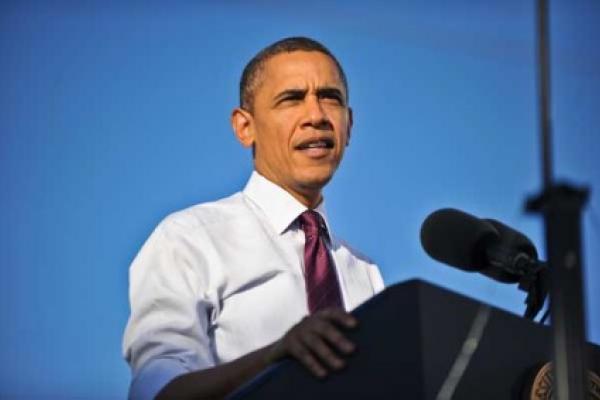Facing criticism that he does not give religious freedom enough attention, President Obama devoted most of his National Prayer Breakfast address to the issue, naming people imprisoned for their beliefs and calling out specific nations.
“We believe that each of us is ‘wonderfully made’ in the image of God,” Obama said. “We therefore believe in the inherent dignity of every human being — dignity that no earthly power can take away. And central to that dignity is freedom of religion.”
Promoting religious freedom is a key objective of U.S. foreign policy, Obama said. He said he is looking to fill the religious freedom ambassador position, one that Suzan Johnson Cook left last fall.
Editor's Note: The following is an excerpt from Joy Carroll Wallis' chapter of the book Faith Forward: A Dialogue on Children, Youth and a New Kind of Christianity.
“Offering your child to God is a way of offering yourself to God again, and it felt that way to me. For the religious and not, there is a powerful spirituality in the birth of a child. Already, we’re learning a little about the unconditional love of God for us in the way we feel about our own child. Through one of the most universal human experiences, parent after parent is taught the lessons of love and life. And all is grace.” – Jim Wallis, following the birth of his son, Luke
Jim and I grew up in Christian families, which brought with it both advantages and disadvantages. My father was a clergyman in the Church of England in the inner city of South London. Jim’s parents were the founders and leaders of a Plymouth Brethren congregation in Detroit. We both rebelled and returned and our stories are well documented in the books we have written.
One of the best gifts that we experienced as the children of Christian leaders was that of an open home. Exposure to family, and friends from many different cultures and walks of life helped shape us. But, more importantly, it allowed us to grow up participating in the ministry of hospitality – and that has stuck. The Wallis home is known to be an “open house.” Our guest room belongs to many people: from a professor teaching a course in town, to a church leader participating in a fellowship program or conference; from a patient recovering from major surgery or illness, to a summer intern visiting from a far-flung part of the world. To add to this, the basement and boys’ rooms are often filled with teenagers or most of a baseball team, and our dining table is full to capacity on a regular basis.
One day when just the members of our family were sitting down to eat dinner, Jim asked who would like to say grace. Jack, who was about four at the time, looked around and said, “But we don’t have enough people!”
The highlight of the Super Bowl for me was Coca-Cola’s "America is Beautiful" commercial. The images of the American landscape are amazing and the song was beautiful. At first I was a bit confused by the different languages singing "America the Beautiful" (I’m slow…), but I caught on about halfway through. When the commercial ended, I looked over at my wife and said, “Wow. That was beautiful … Not worth four million dollars, but that was good.”
For the moment, let’s deal with any cynicism that the Coca-Cola Company is simply trying to sell us their product. Of course they’re trying to sell us their product; that’s why they spent millions on their ad, but along the way, Coke pointed to the reason that I love the United States. I love my country because it is a nation that welcomes the “Other.” Indeed, we haven’t always been good at this, and we still struggle with it, but the United States is a nation of immigrants. Even Native Americans, who have tragically been excluded from the land they’ve lived on for thousands of years, were originally immigrants who were welcomed by this land. This land has a long history of welcoming people into it, and so any act of excluding immigrants goes against its ideal of welcoming the “Other.”
The U.S. needs to quit its crude oil habit. TransCanada needs to see the individuals whose health is directly threatened by Keystone XL. The president and legislators alike need to act for the welfare of not only this generation but for the generations to come, if we indeed want to see the flourishing of future generations. We need to admit to our addiction to oil and identify its harmful ecological impact for what it is.
As a person of faith, I want to see our landscapes, waters and skies restored to wholeness. I am compelled by the love I’ve received from God and God’s people to work alongside others for the common good of all. Having experienced the crisp June evenings of Minnesota as well as the asthma-inducing smog of Hong Kong, I know both the beauty of fresh air and green spaces and the dullness of pollution and gray skies. The chances of enjoying the former are quickly dwindling at our current rate of oil consumption, but we still have time to prevent further environmental degradation, if not for future generations then at least for those of us who still look forward to the rest of their lives, no matter our age.
Whenever I hear about someone else making a case for Young Earth Creationism in the name of Christianity, I’m embarrassed, once again, to associate myself with them. And people wonder why many of us prefer to identify as “Jesus followers” or “Spiritual but not Religious” rather than be lumped in with the Ken Hams of the world.
Duh.
The thing is, a healthy number of us who consider ourselves to be Christian embrace science. We think critically. We accept the likelihood that much we think we understand about the world, the universe, and about our faith can (and should) change as we learn new things. We understand that faith is more about questions than answers, and that the prime mover in our faith practice is to be more like Jesus in our own daily walk, rather than focusing so much on making others more like us.
The desire of a vocal minority (yes, that’s what I said, and I meant it) of Christians to cling to a notion that the entire universe is a few thousand years old, despite the clear physical evidence to the contrary, points less to a reasonable alternate view of the observable world. Rather, it points to a desperate attempt to maintain a dying voice in the cultural conversation.
At the beginning of the 21st century, Americans are used to thinking of slavery as a horror, yes, but one that was banished from these shores nearly 150 years ago. If only that were so.
The trafficking of men, women, and children for labor or sexual exploitation — or both — fuels an underground economy of misery in our midst in many major metropolitan areas and even in rural America. Immigrants without legal status, children in foster care — all those with tenuous community roots — are particularly vulnerable to exploitation.
The U.S. Department of Justice estimates that more than 300,000 children are at risk of being prostituted in the U.S. and that the average age of entry into prostitution for a child victim here is 13 to 14 years old. According to the DOJ, a pimp can make $150,000 to $200,000 per child each year, and the average pimp controls four to six girls. The United Nations estimates that traffickers generate more than $9 billion within the U.S. for both labor and sex trafficking.
As I stated yesterday, I believe that America’s justice system is broken and in need of desperate repair. One of those areas is the practice of putting our citizens to death, something I believe that all Jesus People should resoundingly oppose.
When I was a conservative evangelical, I was a huge supporter of capital punishment for all of the standard reasons. I even had a quick response when folks correctly brought up the hypocrisy of being against abortion while simultaneously being pro-death penalty, a position I previously argued you can’t hold and still call yourself “pro-life.”
However, when I decided to follow Jesus instead of simply being a Christian who paid him hollow worship while conveniently ignoring the red words, I was forced to abandon my support of the death penalty (and abandon my support of violence in general) as part of Following Jesus 101.
While America’s broken justice system is a complex issue, perhaps the first area we can fix is by abolishing the death penalty in all 50 states. Here’s why I think Jesus People should be leading the charge on this issue:





